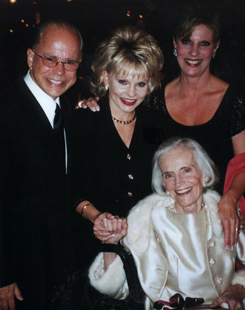Accept One Another:
The Parable of the Unmerciful Servant
By Dan Clendenin
For Sunday September 14, 2014
Lectionary Readings (Revised Common Lectionary, Year A)
Exodus 14:19–31 or Genesis 50:15–21
Psalm 114 or Exodus 15:1–11, 20–21, or Psalm 103
Romans 14:1–12
Matthew 18:21–35
During the darkest days of his public disgrace, the televangelist Jim Bakker found some unexpected friends — the evangelist Billy Graham and his wife Ruth Bell Graham (1920 – 2007).
In 1989, Bakker was convicted on 24 counts of fraud and sentenced to 45 years in prison. At the time, his PTL ministry had annual revenues of $170 million, 3,000 employees, and television programs that aired in 52 countries. His wife at that time, Tammy Faye, was never indicted for wrongdoing.
His twenty-minute tryst with Jessica Hahn, and the $265,000 he paid to keep it quiet, were fodder for late-night comedians. The scorn and ridicule were merciless.
 |
Jim Bakker. |
Bakker's conviction was appealed twice but never overturned. His sentence was reduced twice, but even an early parole was denied, and so Bakker served almost 5 years in prison.
In 2013, Bakker and his second wife Lori visited the Billy Graham Library in Charlotte, North Carolina. While there, they laid flowers on the grave of Ruth. Lori remembers the Grahams as "valley-walking friends with Jim when he went through some very rough trials."
Billy visited Jim in prison several times. The first Sunday after Jim was released from prison, Ruth hosted him at her own church and, in an obvious display of public support, sat with him.
Jim and Lori attended Ruth's 80th birthday celebration in 2000. Lori recalls how "when Jim introduced us, Ruth Graham reached up from her wheel chair and cradled my face in her hands.'You’re so beautiful,' she said. 'God hand-picked you for Jim.' I was so touched by her words, I nearly cried. I managed to thank her for what she had done for my husband and for being such a great example of a woman of God."
Ruth Graham was rooted in reality. Despite her husband's fame, she had both feet on the ground. While Billy golfed with presidents and traveled six months a year, she stayed at home and raised five children. She also wrote a dozen books.
She was a feisty woman with a sharp wit. When an interviewer once asked her if she had ever considered divorce, she responded: "No, I've never thought of divorce in all these 35 years of marriage, but I did think of murder a few times."
We all need a Ruth Bell Graham — someone who will speak to us with clarity and conviction about God's unconditional forgiveness.
And we all need to be a Ruth Bell Graham to others.
In the gospel this week, Peter asked Jesus, "how many times shall I forgive my brother when he sins against me? Up to seven times?" It's a loaded question when you remember that Peter denied ever knowing Jesus, and then deserted him.
 |
Jim and Lori Bakker with Ruth Bell Graham. |
No doubt Peter was proud to appear so extraordinarily merciful as to forgive someone seven times. But Jesus exploded Peter's arithmetic of forgiveness. God's pardon far exceeds even our most exaggerated ideas about forgiveness.
Jesus told a parable about an "unmerciful servant" who received forgiveness for his million-dollar debt. Then, instead of forgiving a tiny debt that he himself was owed, he imprisoned his debtor.
He told us to forgive not merely seven times, but seventy-seven times, or seventy times seven. Divine forgiveness, given and received, is beyond calculation or comprehension. It was so flabbergasting to the original audience that later scribes couldn't agree on what numbers Jesus had actually said.
Forgiveness on that scale is wildly disproportionate to the sincerity of the penitent or the seriousness of their offense. Anyone who seeks "serial forgiveness" makes us question their motives, but Jesus says it doesn't matter — we still forgive them.
Later, after his resurrection, Jesus restored Peter as they sat around a charcoal fire, no doubt a painful reminder of the charcoal fire when he betrayed Jesus at his crucifixion.
St. Augustine once commented, "Do not despair, one of the thieves was saved."
He then observed, "Do not presume, one of the thieves was damned."
Jesus linked receiving forgiveness with offering forgiveness in a sort of law of reciprocity. We can expect divine forgiveness in the measure that we extend human forgiveness: "This is how my heavenly Father will treat each of you unless you forgive your brother from the heart."
Similarly, in the Lord's Prayer, we ask God to "forgive us our debts, as we forgive our debtors." We forgive because we've been forgiven. We can only long for ourselves what we lavish upon others.
In this week's epistle, Paul says that we should never "look down on" another person, that is, despise, scorn, or treat a person with contempt (Rom. 14:3, 10). This same word occurs 11 times in the Greek New Testament, and was used by Jesus, who warned about people who are “confident of their own righteousness and look down on everybody else” (Luke 18:9).
The early monastics were adamant on this point: "The monk, says Moses, must never judge his neighbor at all in any way whatever."
 |
Ruth Bell Graham. |
Instead of judging others, God calls us to protect them. "They said of Abba Macarius that just as God protects the world, so Abba Macarius would cover the faults he saw, as though he did not see them, and those he heard, as though he did not hear them."
The reason for this is an awareness of both human nature and the character of God. St. Maximos the Confessor: "The person who has come to know the weakness of human nature has gained experience of divine power. Such a person never belittles anyone… He knows that God is like a good and loving physician who heals with individual treatment each of those who are trying to make progress."
And so Paul writes in the epistle for this week, "Accept one another, just as God has accepted you" (Romans 14:1, 15:7). Similarly, to the Ephesians, he says, "Be kind and compassionate to one another, forgiving each other, just as in Christ God forgave you."
If you visit the grave of Ruth Bell Graham in Charlotte, you'll find a simple granite stone with an inscription that she herself requested: “End of construction. Thank you for your patience.”
“What a marvelous image for the Christian life," she said, "a work under construction until we go to be with God. That’s what I want as my epitaph.”
As works under construction who need the patience of others to the very end, let us freely give and receive the extravagant forgiveness that Jesus commends.
For further reflection
Romans 5:20, "Where sin increased, grace increased all the more."
Image credits: (1) Upi.com; (2) JimBakkerShow.com; and (3) amazonaws.com.





